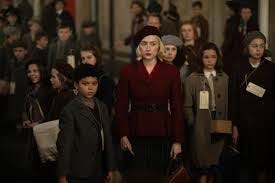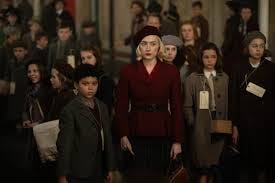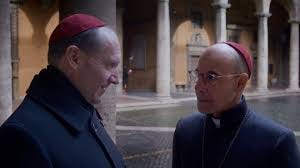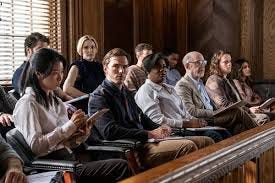As suggested by the title, Blitz opens in late 1940 with German bombing runs over London reducing large swaths of the city into flaming rubble as people scramble in the streets in the hopes of finding shelter. Among them is Rita (Saoirse Ronan), a munitions worker and amateur singer who is belatedly realizing that it is time to take advantage of the government program to ship children out of the city to the safety of the countryside by sending her 9-year-old son George (Elliott Heffernan) away. George is not happy with this development—he would rather stay in London with her and his piano-playing grandfather (Paul Weller)—and after a nasty scene at the train station (where he tells Rita that he hates her and ignores her as she tearfully waves goodbye), he jumps off of the train as soon as he can in the hopes of making it back to London on foot. This leads to a series of encounters with the likes of a friendly Nigerian expat cop (Benjamin Clementine) who encourages him to embrace his Blackness (George’s father was a Grenadian immigrant who was deported on trumped-up charges before he was born) to a gang of thieves who force him to help them rob the corpses of those killed in the bombings. Meanwhile, Rita has learned of his vanishing act from the train and finds herself venturing out into the streets in search of him, accompanied by a shy-but-friendly firefighter (Harris Dickinson).
As you can probably surmise from the description, Blitz goes for a mostly melodramatic approach to its story that favors broad emotions and sentiment over subtlety and nuance, which makes it surprising to discover that it was written and directed by Steve McQueen, whose previous films (including Shame, 12 Years a Slave and Widows) have at least taking stabs at presenting viewers with ostensibly complex moral tales. And yet, the film has the same qualities that have kept me from fully embracing his earlier works (save for the marvelous Small Axe series)—although clearly skilled at staging scenes and eliciting strong performances from his actors, there always seems to be a strange emotional remove from the material that makes it seem as if we are watching little more than super-elaborate dioramas brought somewhat to life. This one is a little better than the majority of his earlier films—the opening blitz sequence is a genuinely impressive bit of tour-de-force cinema and the performances by Ronan and newcomer Heffernan are both strong and convincing. However, for all of the obvious craftsmanship on display throughout, I never found myself fully engaging with it, not even during its shamelessly tear-jerking climax, and when it was all over, all I was left with was the question of why McQueen felt compelled to give us a story as familiar and formulaic as Blitz ultimately proves to be
.As the melodrama Conclave opens, the pope has just passed away in his sleep and Cardinal Thomas Lawrence (Ralph Fiennes), the dean of the College of Cardinals, has been charged with putting together the gathering of cardinals who will be sequestered from the world within the Sistine Chapel to elect a new leader from their numbers. Early on, the two front runners appear to be Cardinal Bellini (Stanley Tucci), who is ostensibly the most progressive of the bunch, and Cardinal Tedesco (Sergio Castellitto), an ultra-conservative candidate who is still raw about the Church having gotten rid of the Latin Mass decades earlier. Others include the ambitious Cardinal Tremblay (John Lithgow), who was the last person to see the previous pope alive during the course of a meeting shrouded in mystery, Cardinal Adeyemi (Lucian Misamati), a Nigerian who would be the first Black pope if elected, and Cardinal Benitez (Carlos Diehz), an unknown figure from Kabul whose admittance into the college was apparently done in secret by the late Pontiff. As the proceedings gone, occasionally rocked by distress in the streets just outside, the fortunes of the various candidates rise and fall as Lawrence tries to keep everything moving along while at the same time grappling with his own crisis of faith that is making him consider leaving the church himself. This all builds to the big finale where—well, all I will say is that unless you have read the 2016 novel by Robert Harris that the film is based on, you almost certainly will not guess exactly what transpires.
Although it has a veneer of pretension to it thanks to the presence of its heavy-duty cast (which also includes Isabella Rossellini in a brief bit as a nun helping to run the conclave behind the scenes) and director Edward Berger, making his first film since his inexplicably celebrated remake of All Quiet on the Western Front from a couple of years ago, Conclave plays like a weird cross between a literary potboiler—the kind of story that one usually finds in the pages of books sold in airports and told in the mostly unspeakable prose of the likes of Clive Cussler or Tom Clancy—and one of those logy screen epics from the 60s that assembled large casts of veteran actors to deliver endless speeches in the hopes of maybe scoring a Supporting Actor nomination, something like a shotgun marriage of Otto Preminger’s Advise and Consent and The Cardinal (though the finale is outrageous enough to push it into Skidoo territory). Although there is admittedly some fun to be had with some of the performances—as usual, Lithgow proves to be keenly adept at villainy, the whole thing becomes a bit of a drag after a while—the tone is so oppressively solemn throughout that some of the more intriguing conceits (such as the debate as to whether the positive optics of naming Adeyemi outweigh his retrograde attitudes) wind up getting smothered along the way, possibly in a misguided attempt to make the truly goofball final revelation stand out more. Conclave cannot decide whether it wants to be a serious meditation on matters of faith, a not-exactly-subtle political allegory or a juicy soap opera and ends up stumbling in all three cases and by the time it was over, I was left with nothing but a strange desire to see Monsignor again—that film was much trashier in every imaginable way but, unlike this one, at least it never committed the sin of being boring
.Juror #2, the title of the latest (and perhaps last) directorial effort from Clint Eastwood, refers to Justin Kemp (Nicholas Hoult), a recovering alcoholic and magazine writer who has been summoned to jury duty. Although hoping to be excused in order to be with his wife (Zoey Deutch), he is in fact seated to hear the case of James Sythe (Gabriel Basso), who is charged with beating his girlfriend (Francesca Eastwood) to death after an altercation in a bar and dumping her body in a gulch. While Sythe’s public defender (Christopher Messina) tries to profess his client’s innocence, prosecutor Faith Killibrew (Toni Collette) is determined to make this an open-and-shut case that will help boost her chances for the upcoming election for district attorney. As the testimony begins, Justin realizes that he was at the same bar that night—not drinking—and begins to suspect with horror that the deer that he thought that he hit was actually the victim. At first, he considers coming clean but when he confides in his AA sponsor/lawyer (Keifer Sutherland), he is told that no one is going to buy his story and he will be looking at a long prison sentence. Once the jury begins to deliberate, it becomes apparent that most of the others see Sythe as guilty and since the trial needs to end with a conclusive verdict, Justin tries to figure out how to sway them into reexamining the facts in the hopes of finding him innocent after all without letting on as to his real motivations.
To say that Juror #2 is not entirely believable is perhaps the understatement of the year and beyond. Even if you can get beyond the incredulity of the basic premise, Jonathan Abrams’s screenplay is filled with additional developments that are insanely implausible—the revelation that the only other juror who is initially taken by Justin’s suggestions (played by J.K. Simmons) turns out to be a retired cop whose former profession would have kept him off of a jury for a case like this is arguably the mildest of them. (Apparently his former job just never came up during the vetting process, a reveal which only makes the conceit ring even more falsely.) And yet, even as the narrative contrivances pile up to to the point where they threaten to make something like Absolute Power seem like an example of virtual neorealism by comparison, I still found myself liking it despite its essentially ludicrous nature. The performances from Hoult, Simmons and Collette are all good (even if the latter lays on her Southern accent a bit thick at times) and Eastwood approaches the material in a relaxed and unfussed manner that, unlike a number of his recent films, doesn’t seem as if he was trying to rush through each setup as quickly as possible. You never buy any of it for even a second but it is still reasonably compelling and even has a couple of interesting things to say about the American justice system and the ways in which it can be manipulated to serve the ends of seemingly everyone but the accused themselves.
More significantly, at a time when movies are increasingly coming across like extended commercials highlight the IP portfolios of the studios behind them, here is the kind of mid-budget adult-oriented feature that Hollywood used to put out in abundance once upon a time but which are practically nonexistent these days and which may be one of the reasons why Warner Brothers is essentially dumping it in a handful of theaters with virtually no promotion. This would be bad enough just on general principles but to see the studio do this to a filmmaker who has served them well for nearly a half-century and brought in millions of dollars and several Oscars along the way is particularly obnoxious—yet another black mark against a studio that used to be seen as a symbol of quality but which seems hell-bent on destroying itself and all it once represented for no identifiably good reason. Sure, Juror #2 will not go down as one of the major films of Eastwood’s sometimes uneven career behind the camera but it is the most consistent one he has done in a while and if it does prove to be his last, then at least he is going out on a reasonably high note.






